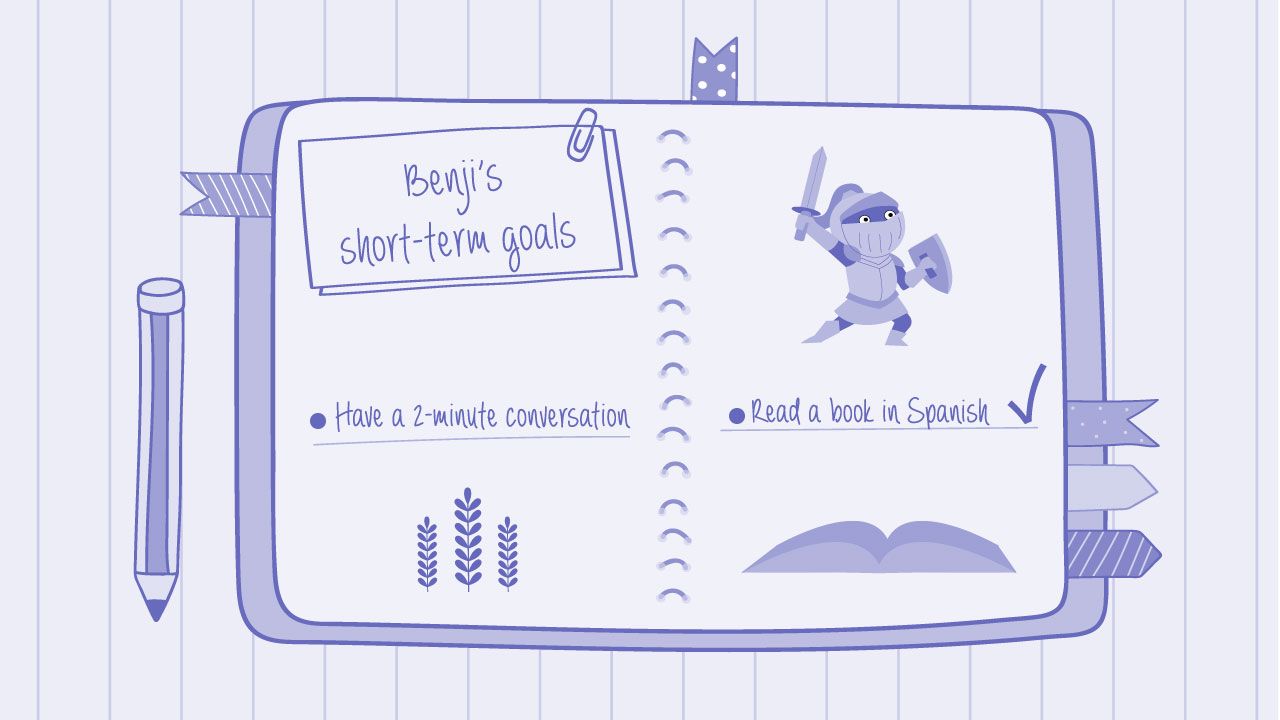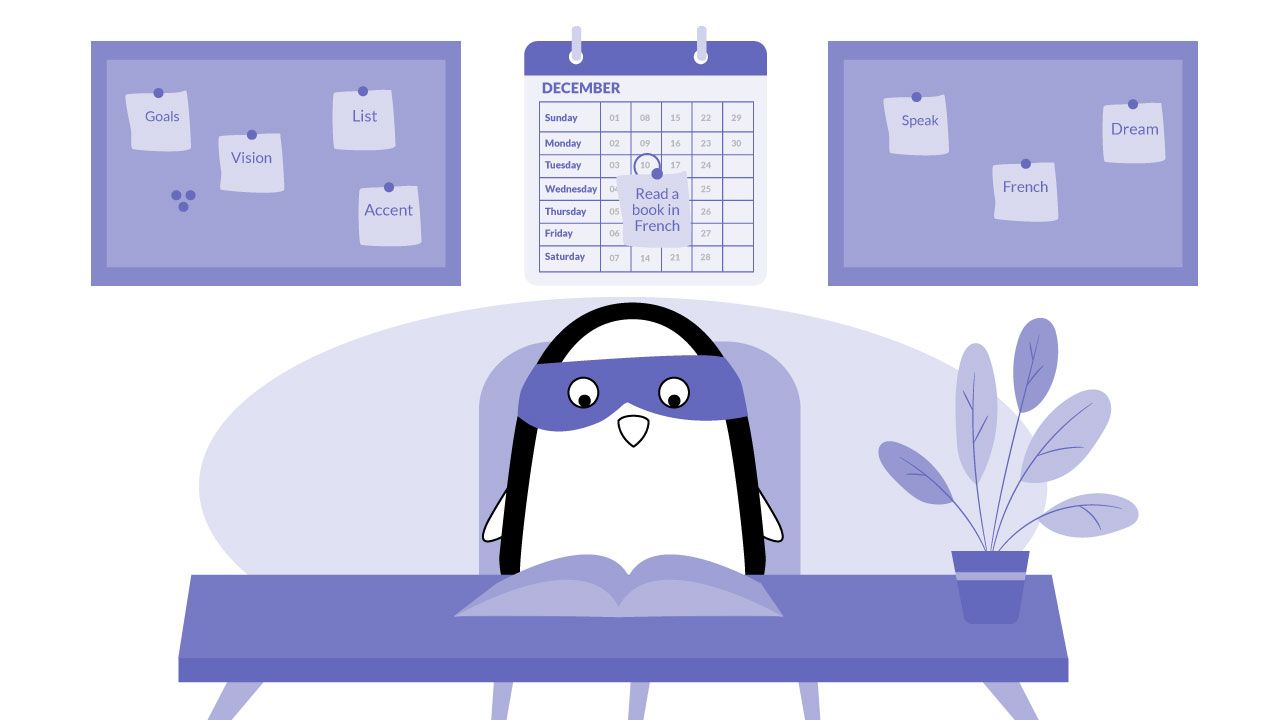
It's no secret that learning a new language can be difficult. In fact, it's often said that it takes around 10,000 hours of practice to become truly proficient in a foreign tongue. So, it's not surprising that many people lose motivation along the way. After all, if it was easy, everyone would do it!
But, with a few simple tricks, you can stay motivated and on track to achieve your language goals. Read on, discover how to stay motivated to learn a language, and find the best steps you can take to stay interested in the process.
Learn French with Langster
Main Problems Associated with the Loss of Motivation
There are two main reasons why people lose motivation when learning a new language. First, they don't see any noticeable progress. Second, they get bored or frustrated with the learning process.
It can be frustrating when you feel like you're putting in lots of effort but aren't making any progress toward your language learning goals. To avoid this problem, it's important to set realistic goals for yourself and look for ways to measure your progress along.
For example, you could create a checklist or set aside time each week to review what you've learned so far.
On the other hand, if you get bored with the language learning process or lose interest in what you're studying, it can help to consider trying a different approach to learning.
For example, if you're struggling with vocabulary and grammar rules, switch to learning by listening or watching videos in your target language.
Or, if you simply feel like you've been studying the same things over and over again, try finding sources of material that are more interesting or engaging than what you've encountered so far.
Of course, these are just two things out of many that influence your motivation levels when learning. To make your life easier and ensure that your language learning journey is interesting and rewarding, there are numerous methods you can use. The easiest will be to follow this short, 6-step guide. Take a look and see how these tips can help you ditch boredom.
How to Motivate Yourself? Start with Why.
But, first, take a moment to remind yourself why you're learning the language in the first place. What is it that motivates you to spend time and energy on this process? Is it personal growth, cultural exploration, career advancement, or simply trying something new?
Whatever your internal motivation for learning a language may be, make sure that you keep it in mind. It can help to set your main language learning goals and feel the same interest for the language as when you just started.
Step 1: Set Interim Goals

Having clear goals that you can track is important for learning a language, but it's also dependent on the type of goals you have. One big goal will be good for understanding why you're learning a language, but it won't keep you motivated for long. Instead, boost your brain by regularly achieving smaller goals.
Start by dividing your language learning goals into short, easy milestones. For example, after each week of study, set a goal to learn at least 10 new words or phrases. Or something like “Have a 2-minute conversation with a native speaker.”
By doing this, you will be able to visualize what you have achieved already, see your progress, and feel more motivated to continue.
Step 2: Learn with Other People

You are a social being, so it is no surprise that learning a language with others can be more entertaining than doing it on your own. Not only will it give a competitive edge to the process, but you will also find someone you can rely on in this area of your life.
Moreover, there's nothing better than correcting yourself in real time or having a chat with someone who will tell you if you're using an incorrect grammar tense.
Real-life interactions in the target language will give you a huge motivation boost – regardless of how short they are – simply because you will hear yourself speak and answer the questions.
These little things may not seem like much, but they make all the difference when it comes to learning the language.
Where to find a learning buddy?
You can find a language exchange partner on appropriate platforms or Facebook groups, or join a study group of language learners that share your level and interests.
Another option is to sign up for online courses led by an experienced teacher or hire a tutor – knowing that someone can help you and check your progress will help you feel less alone in the learning process.
Step 3: Find Something to Look Forward to
As humans, we tend to avoid pain and seek pleasure. So, if you don't have any work deadlines or exams coming up, it will be hard for you to motivate yourself.
Therefore, giving yourself some rewards for even short-term goals will help you stay on track with your long-term plans. But what rewards can keep you going when learning is not a reward by itself?
How to Reward Yourself?
The simplest way of doing this is to do something pleasant for yourself after achieving every goal. It doesn't have to be anything expensive or time-consuming: for example, as soon as you learn 20 new words in a week, schedule a coffee date with a friend or treat yourself to something nice.
Such rewards will increase your language learning motivation and give you a physical experience to wait for, like a treat at the end of each week or month, or maybe a day trip to another city. In the end, do whatever will make you feel proud and happy about every small achievement,
Step 4: Stay Disciplined but Flexible
Staying consistent with your studies is important not only for you to actually learn more information in a shorter time, but also to avoid feeling frustrated and giving up. At the same time, if you are too strict with yourself in terms of time management or give up any other activities, it will be hard for you to stay motivated.
Therefore, a good strategy is to set a daily routine that includes studying regularly and scheduling some breaks to do something completely different from the learning process, like watching a favorite series or having a video call with friends.
Studying the language regularly will help you get used to the lessons and see that your language skills are improving. And you will still be able to relax every once in a while.
Step 5: Set a Deadline

Sometimes a deadline is just what you need to keep up with a goal. This will keep you focused, give you a sense of urgency, and make sure that you won't procrastinate or postpone the learning session.
You can set more than one deadline for yourself, depending on the goal.
For example, say you have no exams coming up in 6 months. You can still have a goal of completing a book within 3 months (or acquiring basic fluency by then) or speaking with your friend for 20 minutes without making any mistakes.
Having these mini-deadlines will help you stay disciplined and set a proper studying schedule.
Remember to Stay Comfortable
Of course, this is not a good tip for everyone: some people will feel less motivated when there's the added pressure of keeping up with a deadline.
In that case, it's important to pay attention to staying comfortable when learning. Don’t judge yourself for not maintaining your schedule, and consider using other methods for getting that extra motivation.
Step 6: Mix Up Your Resources and Try Something New
You'll get burnt out fast if you only use one textbook or stick to online lessons, so vary your resources to keep things interesting. In addition to different books, consider watching movies and TV shows in the target language, listening to music, and regularly talking to native speakers (the best way to hone your fluency!).
Make every learning session fun, and adjust to your learning style. Try out different methods and resources, even if they seem unconventional or less effective than what you're already used to.
Some ways of learning may work better with the particular language you’re interested in, while others won’t help much. In the end, you never know – you might actually find something that works much better for you than the others.
Remember: Language Learning Should Be Fun!

At the end of the day, staying motivated when learning a new language is all about finding what works best for you personally. Whether it's setting realistic goals, treating yourself to rewards along the way, or simply keeping things interesting by experimenting with different resources, be sure to pay attention to how you feel while studying, and make adjustments as needed.
Remember that staying motivated is key for future success with a new language. You won’t get far by forcing yourself to learn and drilling new words and rules. Instead, try to make the process as fun as possible. With some patience and persistence, you'll soon be fluent in your target language!









